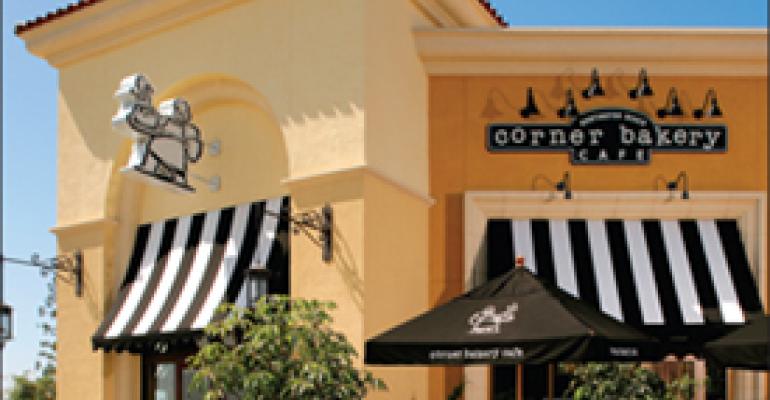DALLAS Corner Bakery Cafe, the 98-unit chain concept devised in 1991 by Richard Melman’s Lettuce Entertain You Enterprises and formerly owned by Brinker International, is moving more aggressively to challenge segment leader Panera Bread by taking the plunge into mainstream franchising. —
CBC Restaurant Corp., whose only Corner Bakery franchisee to date was HMSHost Corp., operator of four airport outlets, has granted rights for the development of 25 new bakery-cafes to the Rose Group, a 54-unit Applebee’s franchisee based in Newtown, Pa. —
Rose Group agreed to build the cafes in the Philadelphia and southern New Jersey markets over the next seven years and also to assume ownership of the three CBC-owned Corner Bakery Cafes now operating in Philadelphia. Terms were not disclosed. —
Dallas-based CBC was formed last year when Corner Bakery was acquired from Brinker by Il Fornaio (America) Corp., the Corte Madera, Calif.-based operator of the Il Fornaio upscale Italian dinnerhouse and bakery chain. —
Il Fornaio chairman and chief executive Mike Hislop said CBC now plans to add five to six franchisees each year, with the goal of expanding into new markets. CBC also would continue to open Corner Bakery units in existing markets, particularly California, aiming for annual growth of 15 percent to 20 percent. Other core markets are Dallas and Washington, D.C. —
In addition to its Applebee’s restaurants in eastern Pennsylvania and Maryland, Rose Group recently launched a proprietary Irish pub concept called The Shannon Rose in Clifton, N.J. —
CBC officials said any new franchisee would have to be able to open 10 to 20 Corner Bakery outlets in new markets. —
Despite annual average-unit volumes of almost $2.2 million and reports of 19 consecutive quarters of positive same-store sales, Corner Bakery faces the uphill challenge of taking on bakery-cafe giant Panera Bread. —
Based in Richmond Heights, Mo., Panera and its franchisees have 1,027 units in 38 states, 696 of which are franchised. The chain expects to add a total of 170 to 180 company and franchised branches in 2007. —
Also playing catch-up in the bakery-cafe sector is Boston-based Au Bon Pain, which plans to ramp up U.S. and international growth, with a goal of doubling the 225-unit chain in size over the next five years. —
Still, it was Corner Bakery’s perceived franchising potential in part that attracted Il Fornaio as a buyer. One of the portfolio companies of New York-based investment firm Bruckmann, Rosser, Sherrill & Co., Il Fornaio owns 22 namesake restaurants with retail bakeries and operates wholesale bakery production facilities. —
Hislop said previous owner Brinker International had begun to consider franchising of the Corner Bakery Cafe concept. —
Under Brinker, a new Corner Bakery prototype was developed with a new color scheme, expanded seating for about 100, a new patio design and improved kitchen efficiencies. Those newer models also place an emphasis on reflecting the neighborhoods where they are located, with murals and photos depicting the community. —
So far the new prototype units in Southern California have averaged sales about $300,000 to $400,000 more per year than older units, Hislop said. —
Lunch accounts for about 50 percent of sales, and about half of Corner Bakery’s customers are estimated to visit more than once per week. —
The chain also has been featuring catering and beefing up menu development to draw in more breakfast and dinner business. Corner Bakery recently began testing a new quiche, for example, which works across all dayparts, Hislop said. —
Egg scramblers at breakfast, paninis and salads at lunch, and pasta dishes at dinner all have helped differentiate the brand from Panera Bread and other bakery specialty competitors, he added. —
Hislop said franchise growth would be “conservative,” in that the company is looking only for established franchisees with multiunit restaurant experience. —
Franchisees must have at least $3 million in nonborrowed cash, a net worth of more than $7.5 million, and an existing infrastructure and real-estate experience in the market to be developed. —
According to CBC’s franchise offering circular, initial per-restaurant investment costs are estimated to be between $1.2 million and $2.3 million, not including the costs of buying or leasing a location. —
Harry Rose, chairman and chief executive of the Rose Group, said Corner Bakery was a good fit because “the segment has great opportunity.” —
“Panera is king, but we liked what CBC was doing,” Rose said. “They’ve been evolving the menu and their operating process, and it’s working.” —
Before focusing on Applebee’s and launching the Irish pub and live-entertainment concept in May with another Applebee’s franchisee, Rose Group had opened franchised branches of several other brands, including Boston Market, Johnny Carino’s, Roy Rogers and Einstein Bros. Bagels. —
Although Panera has penetrated the Greater Philadelphia market where Rose Group will grow Corner Bakery, “we think there’s room out there for more than just Panera,” Rose said. —
Rose Group will take over the operation of CBC’s three Corner Bakery units in Philadelphia in August. —
Though international expansion has been a part of Au Bon Pain’s growth plan, Corner Bakery is not looking abroad unless a good opportunity presents itself in Canada, said P.J. Evans, CBC’s vice president of franchising. —
CBC also hopes to add more franchised units in airports with HMSHost and other nontraditional foodservice operators. —
Evans said Corner Bakery’s goal of annual growth as high as 20 percent, and the planned buildup of a franchise pipeline, are “conservative, methodical and strategic.” —
The chain was “not going to grow for growth’s sake,” he said. “My job is to get the best franchisees, not the most.” —




